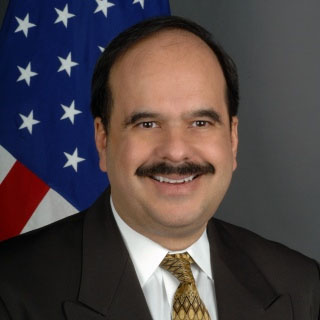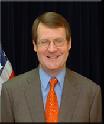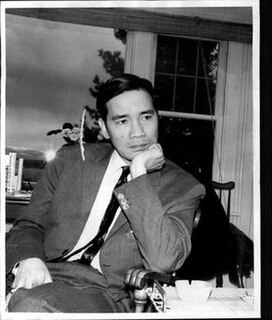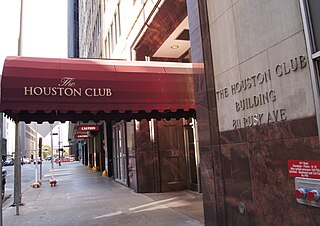
The United States Department of State (DOS), commonly referred to as the State Department, is the federal executive department that advises the President and conducts international relations. Equivalent to the foreign ministry of other countries, it was established in 1789 as the nation's first executive department. The current Secretary of State is Mike Pompeo, who ascended to the office in April 2018 after Rex Tillerson resigned.

A diplomat is a person appointed by a state to conduct diplomacy with one or more other states or international organizations. The main functions of diplomats are: representation and protection of the interests and nationals of the sending state; initiation and facilitation of strategic agreements; treaties and conventions; promotion of information; trade and commerce; technology; and friendly relations. Seasoned diplomats of international repute are used in international organizations as well as multinational companies for their experience in management and negotiating skills. Diplomats are members of foreign services and diplomatic corps of various nations of the world.

R. Nicholas Burns is a university professor, columnist, lecturer and former American diplomat. He is currently Professor of the Practice of Diplomacy and International Politics at Harvard's John F. Kennedy School of Government and a member of the Board of Directors of the school's Belfer Center for Science and International Affairs. At the Harvard Kennedy School, he is director of The Future of Diplomacy Project and Faculty Chair for the programs on the Middle East and India and South Asia. He is Director of the Aspen Strategy Group, senior counselor at The Cohen Group and serves on the Board of Directors of Entegris, Inc. He writes a bi-weekly column on foreign affairs for The Boston Globe and is a senior foreign affairs columnist for GlobalPost. He also serves on the Board of Directors of the Council on Foreign Relations, Special Olympics, the Rockefeller Brothers Fund, the Atlantic Council, the Appeal of Conscience Foundation, the Center for the Study of the Presidency and Congress, American Media Abroad, the Gennadius Library and the Richard Lounsbery Foundation.
Ambassador John W. Limbert is the former Deputy Assistant Secretary of State for Iran in the State Department's Bureau of Near Eastern Affairs. He is a veteran U.S. diplomat and a former official at the U.S. Embassy in Tehran, where he was held captive during the Iran hostage crisis.

Alberto Miguel Fernandez is a Cuban-American former diplomat who is currently President of the Middle East Broadcasting Networks (MBN), which includes Al-Hurra.
Mary Thompson-Jones is a retired senior Foreign Service Officer in the United States' Department of State. In July 2016, she published her first book, To The Secretary: Leaked Embassy Cables and America's Foreign Policy Disconnect.

Senegal–United States relations are bilateral relations between Senegal and the United States.

The Delegation of the European Union to the United States represents the European Union in the United States, working in coordination with the diplomatic and consular missions of all the EU Member States. It is located at 2175 K Street, N.W., in the West End neighborhood of Washington, D.C..

Mark C. Minton is career member (retired) of the United States Foreign Service and served as the U.S. Ambassador to Mongolia from 2006 to 2009. He was formally President of the Korea Society from 2010 to 2015 and then joined the faculty of the School of Global and International Studies at Indiana University Bloomington.
An agricultural attaché is a diplomat who collects, analyzes, and acts on information on agriculture, agribusiness, food, and other related spheres in a foreign country or countries. Agricultural attachés may be directly employed by the sending country's agriculture ministry, or they may be employed by the foreign ministry. Typical activities of an agricultural attaché include reporting on crop conditions, food availability, domestic agricultural policy and the foreign trade outlook in agricultural commodities; negotiating food aid agreements and agricultural credit lines; implementing agricultural technical assistance programs; facilitating professional contacts, exchanges, and technology transfer; assisting in negotiating bilateral and multilateral trade agreements; and promoting the exports of agricultural and food products. In many cases, agricultural attachés may also bear responsibility for issues related to the environment, food security, food safety, fisheries, forestry, and indeed anything related to rural areas and the rural economy.

Walter R. Roberts was a writer, lecturer, and former government official.

Diplomacy is the art and practice of conducting negotiations between representatives of states. It usually refers to international diplomacy, the conduct of international relations through the intercession of professional diplomats with regard to a full range of topical issues. International treaties are usually negotiated by diplomats prior to endorsement by national politicians. David Stevenson reports that by 1900 the term "diplomats" also covered diplomatic services, consular services and foreign ministry officials.

James Warlick is a US diplomat, former United States Ambassador to Bulgaria.

Richard J. Schmierer is a United States diplomat. He served as the United States Ambassador to Oman through August 2012.

The Embassy of Israel in Washington, D.C. is the diplomatic mission of the State of Israel to the United States. It is located at 3514 International Drive, Northwest, Washington, D.C., in the Cleveland Park neighborhood.

Trần Văn Dĩnh was a Vietnamese diplomat, author, professor of international politics and communications at Temple University, Philadelphia, Pennsylvania. In his words, "I am a Vietnamese by birth, an American by choice."

Science & Diplomacy is a quarterly magazine published by the Center for Science Diplomacy of the American Association for the Advancement of Science (AAAS). The publication includes articles, short comments (perspectives), and letters on issues in the field of science diplomacy, diplomacy about scientific issues.




















